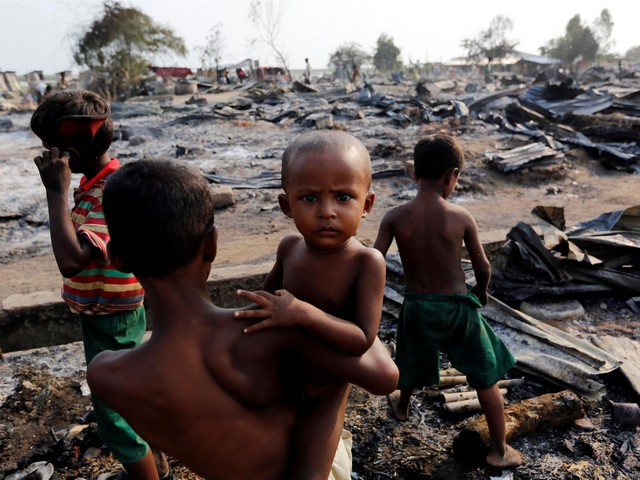PERMANENT PEOPLES’ TRIBUNAL
Session on
State Crimes Allegedly Committed in Myanmar against the Rohingyas, Kachins and Other Groups
University of Malaya, Faculty of Law
18-22 September 2017, Kuala Lumpur, Malaysia
Panel of the Judges:
Daniel Feierstein (Argentina), who chaired the panel
Zulaiha Ismal (Malaysia)
Helen Jarvis (Cambodia-Australia)
Gill H. Boehringer (Australia)
Nursyahbani Katjasungkana (Indonesia)
Shadi Sadr (Iran)
Nello Rossi (Italy)
PRESS RELEASE
General Secretariat:
VIA DELLA DOGANA VECCHIA 5 – 00186 ROME – TEL:0039 0668801468
E-mail:ppt@permanentpeoplestribunal.org
www.tribunalepermanentedeipopoli.fondazionebasso.it
The Judgment presented today by the Panel of the Judges of this Session of the Permanent Peoples’ Tribunal (PPT) is the product of a long term research work, which included not only the close monitoring of the many published reports, but of formal public hearings in London, 6-7 March 2017, and in these days 18-22 in Kuala Lumpur.
The deliberation of the seven Judges is very detailed in the analysis of the facts and in their qualification according to the best recognized instruments and criteria of international law: the State of Myanmar is fully responsible for genocide against the Rohingya people, and is further responsible not only for genocidal intent against the Kachin and the Muslim minority, but also and more specifically for crimes of war against the Kachins and crimes against humanity against the Kachins and the Muslim groups.
The full responsibility of the State of Myanmar for the above crimes is made more hideous because of the state of total impunity which is guaranteed by the substantial absence of a judicial system, as it is totally dependent from the military Government which is de facto the only ruling power.
The qualification of genocide corresponds to the highest level of criminal responsibility and its foundations are analysed and documented in all its aspects: in the systematic policies of discrimination and physical elimination, in the active denial of identity and culture, including even the prohibition from using the term Rohingya. The witnesses heard in London and in Kuala Lumpur testified both in public hearings and in camera sessions (to protect their identity and for security reasons). Together with the reports of international experts (from Bangladesh, UK, USA) and the contribution of a very competent team of Prosecutors, they have provided evidence of the systematic use of the whole spectrum of atrocious violations of the right to life and dignity of the affected populations: raping of women was possibly the most conspicuously present, beside the killing and burning of children and elderly, tortures, and the long list of acts included in the definitions of genocide, crimes against humanity and crimes of war.
The PPT is the expression of the need and duty to react of the civil society to give the victims their identity as subjects who must be recognized as such and defended by the international community. In this sense, the Panel of the Judges has not concluded its work simply with a Judgment, which will be forwarded to the Myanmar authorities and to the international agencies and actors, but has issued a well targeted list of recommendations which must be implemented, to stop the ongoing genocidal process against the Rohingyas and to avoid the intended genocide against the Kachins and the other Muslim groups.
It is worth mentioning that the Government of Myanmar duly and timely informed of the PPT procedures and of its rights to defence never responded nor accepted to appear in the PPT court.

